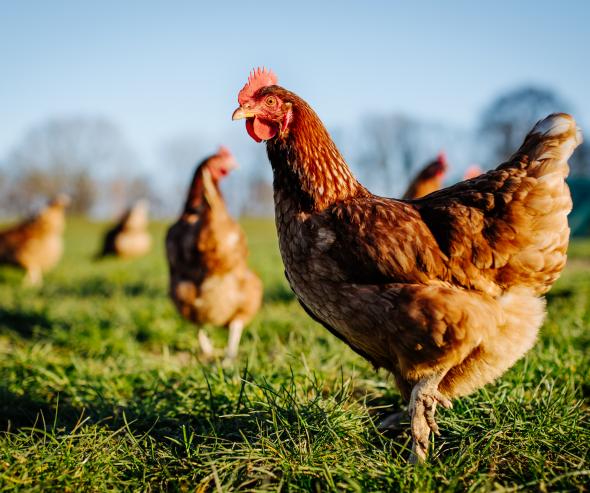The Autorité de la concurrence clears, subject to conditions, the acquisition of the Ronsard Group by the LDC Group

A number of slaughterhouses will have to be divested to maintain sufficient competition for poultry farmers.
On 8 January 2021, the LDC Group notified the Autorité of its plan to acquire sole control of the Ronsard Group, previously owned by the Eureden Group.
Parties to the transaction
The LDC Group, which owns the Le Gaulois, Maître Coq, Marie and Loué brands, is organised around four sections:
- the "upstream" section, which includes poultry production, cereal and agricultural supplies collection, and egg production;
- the "poultry" section, specialising in the slaughtering and marketing of poultry and processed poultry products;
- the "catering" section, specialising in the production and marketing of catering products;
- the "international" section, comprising subsidiaries in Poland, Hungary and Spain.
The LDC Group achieved a turnover of 4.4 billion euros.
The Ronsard Group has six slaughterhouses located in Morbihan (two slaughterhouses), Ain
(two slaughterhouses), Eure-et-Loir and Landes. It also markets poultry products (in particular poultry meat and processed poultry products). The Ronsard Group achieved a turnover of 170 million euros in 2019.
The markets examined
The parties are active at various levels of the poultry industry.
Upstream, they are active as purchasers on the markets for the collection of live poultry for slaughter.
Downstream, they are active as sellers on the markets for the marketing of poultry meat and processed poultry meat products.
The Ronsard Group also provides live poultry slaughtering services for third parties in Morbihan, an activity that consists of a slaughterhouse slaughtering the animals that are entrusted to it by a third party and then returned to the third party, which pays a slaughtering service in return.
The Autorité has identified competition issues in the Ain and Morbihan regions
- On the markets for the collection of live poultry for slaughter
The LDC and Ronsard Groups are both present mainly in the Ain, Morbihan and Landes regions. In the latter two départements, the transaction does not affect competition, since farmers will continue to have alternative makes to the new entity (competing slaughterhouses) for selling their production. As regards the Ain region, the transaction strengthens the position of LDC, which was already a major buyer in the area, thus depriving farmers of alternative markets in the region.
- On the market for the slaughter of poultry for third parties
The Ronsard Group currently provides standard turkey slaughtering services in its CADF slaughterhouse in Morbihan for third-party operators, who then use the slaughtered animals and market them as fresh meat or processed products, markets in which Ronsard has little presence. However, the situation is different with regard to the LDC Group, which is present in these downstream markets for the sale of standard turkey meat and processed turkey meat products. The Autorité thus considered that, by acquiring control of the CADF slaughterhouse, LDC could hinder the access of its competitors to this slaughterhouse, to prevent them from competing with it downstream in the sales markets.
- On the markets for the marketing of fresh meat and processed poultry meat products.
In view of the Ronsard Group's generally limited market shares in the various markets for the sale of fresh meat and processed poultry meat products, the existence of strong competing groups and the countervailing power of buyers (mass retail, out-of-home catering and the agri-food industry), the Autorité considered that the transaction was not likely to harm competition in these markets.
The proposed commitments
To address the risks to competition identified by the Autorité in the markets for the collection of live poultry in Ain, the LDC Group has committed to divest the two slaughterhouses of the Ronsard Group located in Ain, thereby eliminating any overlapping activities in that département. The divestiture of one of these two slaughterhouses will be carried out under a fix-it-first mechanism, which allows the Autorité to directly approve the buyer of the divested asset as part of the clearance decision. The S2M Group, which specialises in the marketing of kosher meat, will take over the Ronsard Bresse slaughterhouse.
In Morbihan, the LDC Group has committed to not acquire or subsequently take over the CADF slaughterhouse. The Eureden Group, which until now has owned the Ronsard Group, will thus remain the owner of the CADF slaughterhouse, thereby eliminating any risk of reduced access to this slaughterhouse.
What is a fix-it-first type of commitment or settlement?
A fix-it-first type commitment resolves competition issues in advance. In this case, it means identifying a buyer for the assets concerned by the remedy, in this case S2M, before the Autorité's decision is adopted.
The use of fix-it-first reduces the uncertainty and the time required to implement the commitment, as it eliminates the period of searching for and approving the buyer.
The Autorité has already had recourse to fix-it-first commitments on four occasions:
- Decision 09-DCC-67 of 23 November 2009 (LDC Volailles/Arrivé),
- Decision 15-DCC-53 of 15 May 2015 (UGI/Totalgaz),
- Decision 19-DCC-15 of 29 January 2019 (Dr. Oetker/Alsa),
- Decision 20-DCC-72 of 26 May 2020 (Groupe Bernard Hayot/Vindémia Group)
Contact(s)
